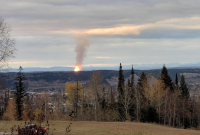Support strong Canadian climate journalism for 2025
Natural gas service to much of British Columbia was being gradually restored Thursday after a pipeline explosion north of Prince George shut down a major supply artery to homes, institutions and industries.
The cause of Tuesday's explosion in the Enbridge pipeline is under investigation, with teams of investigators from the company, National Energy Board and the Transportation Safety Board at the blast site, about 15 kilometres northeast of Prince George.
There were no injuries and RCMP said Thursday there are no indications the explosion was criminal in nature.
Enbridge said it received NEB approval late Wednesday to restart its 76-centimetre line, which was shut down as a precaution because it is in the same path as the pipeline that exploded and burned.
The second pipeline was carefully checked before permission was received to restart it at about 80 per cent of its normal capacity, Enbridge said in a statement.
Gasoline prices jumped Thursday and were expected to continue to rise as oil refineries in Washington state started to shut down operations. The refineries are largely fuelled by natural gas from the B.C. pipeline.
The natural gas supply disruption saw major industries and institutions switch energy sources, reduce operations or shut down temporarily.
Tolko Industries Ltd. closed its Heffley Creek plywood plant near Kamloops and reduced operations at sawmills in the Cariboo at Quesnel and Soda Creek.
The B.C. Institute of Technology said in a tweet that heat is off on the north side of its Burnaby campus until further notice, while the University of B.C. told researchers and other non-essential users to immediately stop using natural gas.
"When the system is stable, we'll work to return our customers who have curtailed their gas use back on line," said Doug Stout, FortisBC vice-president of external relations in a statement. "Until this is complete, we ask our customers to please continue avoiding non-essential use of gas until the situation is completely resolved."
He said 85 per cent of the gas FortisBC feeds to about one million B.C. customers is carried by the twinned Enbridge pipeline that runs from northern B.C. to the United States border south of Vancouver.
About 750,000 natural gas customers in the northwest U.S. are also impacted by the explosion.
Dan McTeague, a senior petroleum analyst at GasBuddy.com, said he expected gasoline prices in the Vancouver area to hit highs of $1.65 per litre if the supply issue persists.
"Basically, don't panic," he said in an interview. "Once an announcement is made that somehow this is repaired or that the refineries are not affected or that this may have just been a temporary situation then we are likely to see prices drop."
Iain Colquhoun, the National Energy Board's chief engineer, said it has six investigators at the blast site. He said it's still too early to determine a cause of the explosion.
The pipeline was buried 1.7 metres below the ground, said Colquhoun. It was installed in 1972 and the smaller pipeline, which is back in operation on a reduced basis dates back to 1957.
Colquhoun said Enbridge records indicate the last inspection on the pipeline was conducted by the company last year.
"To the best of our knowledge and from what we can see ... there were no worrisome anomalies in the line," he said in a telephone interview from Calgary. "We'll know better when we look at it ourselves."
Colquhoun said he expected a detailed metallurgical analysis of the fractured pipe could take one month at the earliest.
He said the blast left a crater and a burn area of about 400 metres.
"It's a rough estimate but I would say 400 metres would be the edge of where anything would be burned," said Colquhoun. "The crater is quite small, I would say four, five metres across."
About 100 people living within one kilometre of the explosion area on the Lheidli T'enneh First Nation reserve were evacuated Tuesday night after the explosion and fire.
Terry Teegee, B.C.'s Assembly of First Nation's regional chief, lives on the reserve and said he saw a 60-metre high fireball and was pelted by debris from the blast.




Comments
God forbid they should use some of their obscene profits to subsidize the problem. They, of course, make us pay.